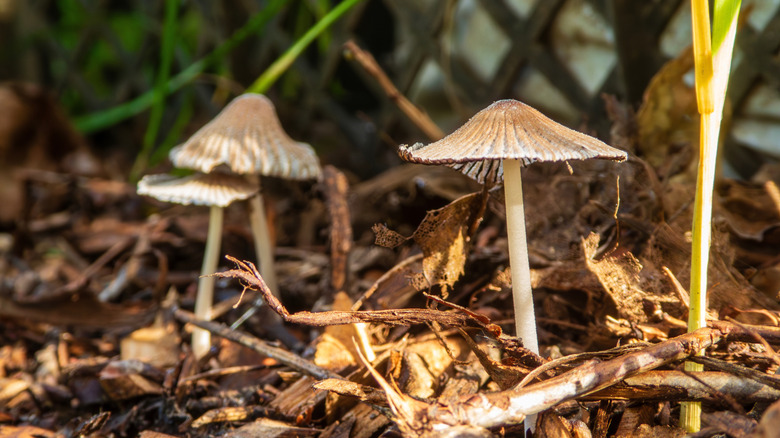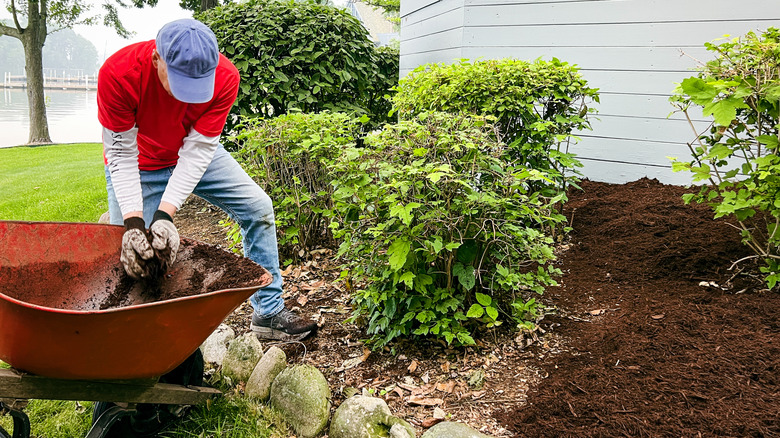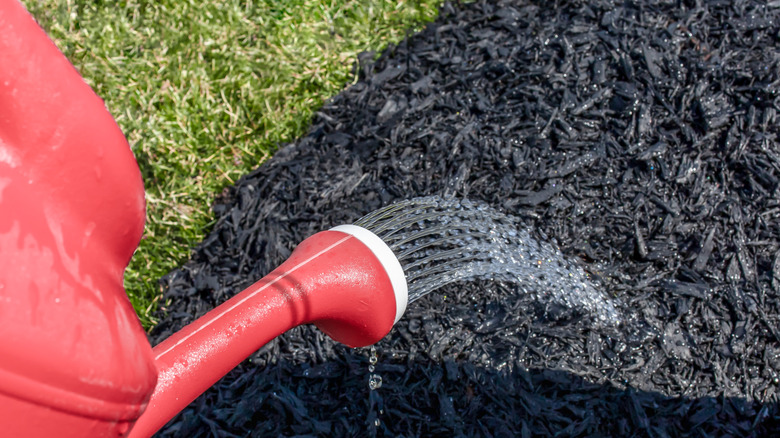How To Stop Mushrooms From Growing In Mulch
Garden preparation is not always easy, so it can be disheartening when you see as many mushrooms growing in your mulch as plants. You may be left wondering what you did wrong to invite these unwelcome guests into your beds. The answer is most likely nothing at all. Mushrooms thrive in moist environments. Since mulch is designed to hold in moisture around plants, it's no surprise that they are commonly found growing in the material. Most mushrooms don't need to be removed. In fact, they may be a sign that you are doing gardening right. Mushrooms aren't all bad. Their presence in your garden or on your mulch could indicate healthy soil conditions since they feed on rich, organic materials. Before taking measures to stop mushroom growth, consider what mushrooms growing in mulch are telling you about the health of your plants.
That being said, mushrooms in your mulch may be a sign that the area you laid it in is too moist. It could also mean you've used the wrong kind of mulch or too much mulch. A lack of sunlight is a factor, too. Once you've determined the cause of the mushroom takeover, you can implement measures to keep them from growing in your mulch — sometimes for good. This could mean changing the type of mulch you're using, adjusting how much mulch you use, paying more attention to moisture levels, or treating the mulch with additives that prevent mushrooms from growing. However, to preserve the fruits of your labor you actually want in your garden, stay away from mushroom-eliminating lawn care tips that may do more harm than good, like adding hydrated lime.
How to prepare mulch to prevent mushroom growth
Preventing mushroom growth in your mulch starts with carefully selecting the best type of mulch for your garden. You need a material that won't promote fungal growth, but will still provide benefits for your plants. Choose wood materials that break down slowly, like pine, cedar, or cypress. The faster organic matter breaks down, or the softer it is, the more attractive it is for mycelium, the underground living networks that produce mushrooms. Alternatively, you could use an inorganic mulch, like gravel or rubber, which will reduce or even prevent mushroom growth.
Beyond the type of mulch you choose, you also need to regulate moisture levels in your garden bed. Mulch is mostly used to help soil and plant roots better retain moisture. However, adding too much mulch to the soil surface can result in excess water retention. That's great for damp-loving mushroom species, but it's not ideal for most garden plants outside of aquatics. Keep your mulch layer thin — 2 to 3 inches deep is ideal. You can also don a pair of gloves and turn the mulch with a rake a few times each season to keep moisture from settling and improve air flow. In addition, heavily shaded areas are more prone to mushroom growth. Trim back branches from nearby trees or shrubs that overhang and shade the problem spot.
How to stop mushrooms growing in mulch for good
If you notice that mushrooms have already started growing in your mulch, there are ways to stop them. You could, of course, use a fungicide on the area, but you need to use it carefully and in moderation to reduce the chance of damaging your plants through phytotoxicity. Since the mushrooms that appear in mulch don't threaten your plants like a fungal disease would, using fungicide is almost always overkill. First, try safer prevention methods to rid mulch of mushrooms. Mix the mulch into the top layer of soil, creating a thick pile, and wet it thoroughly. Once the material reaches 110 degrees Fahrenheit through a process called self-heating, the fungal spores will die.
Another secret hack to removing mushrooms is hiding in your kitchen. In fact, there are two household staples that may stop mushrooms from growing in mulch: vinegar and dish soap. You don't use them together, though. Remove any mushrooms you can see before treating the area. Soak the mulch using a sprayer or watering can with a mixture of five tablespoons of vinegar in a gallon of water, which can kill mushroom spores and prevent future growth. Note, however, that concentrated vinegar may damage plants, especially if used when the sun is shining brightly. It breaks down plant cells, burning leaves and stems. Similarly, you can mix dish soap with water and spray the solution onto the affected area. For both options, it's still best to identify and address the underlying causes first, such as mulch type and moisture levels.


